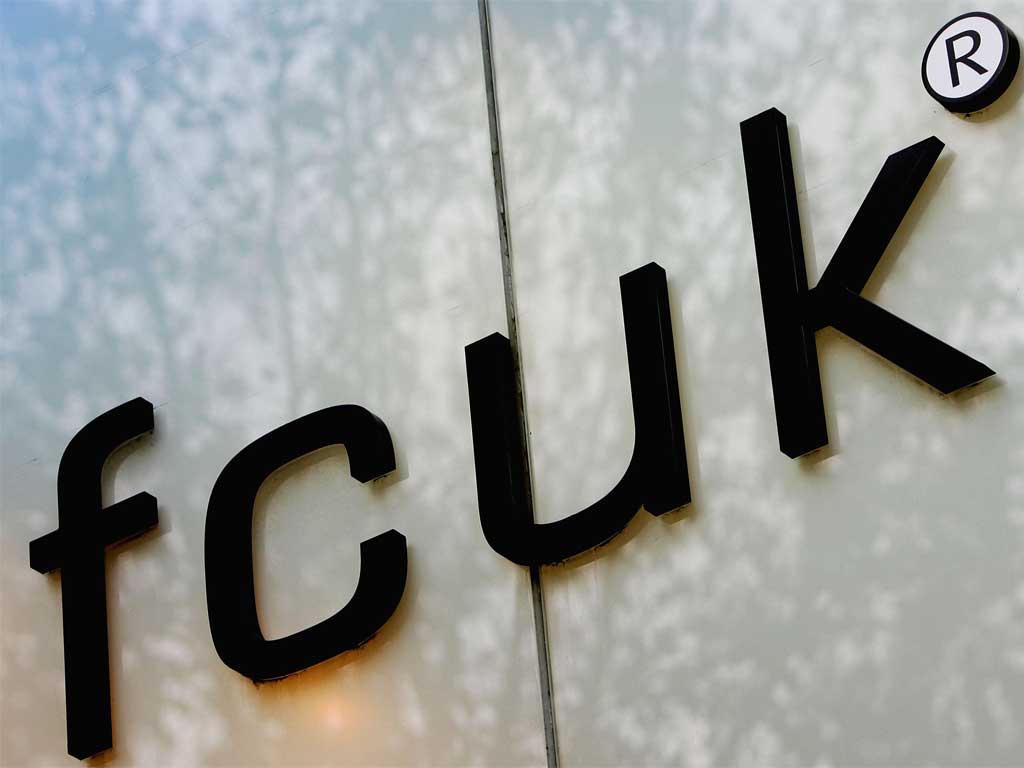FCUK: The logo that became a no no
French Connection's eye-catching – and headline-grabbing – FCUK branding was a huge success in the 1990s, but is it behind the clothing store's current financial woes?

Your support helps us to tell the story
From reproductive rights to climate change to Big Tech, The Independent is on the ground when the story is developing. Whether it's investigating the financials of Elon Musk's pro-Trump PAC or producing our latest documentary, 'The A Word', which shines a light on the American women fighting for reproductive rights, we know how important it is to parse out the facts from the messaging.
At such a critical moment in US history, we need reporters on the ground. Your donation allows us to keep sending journalists to speak to both sides of the story.
The Independent is trusted by Americans across the entire political spectrum. And unlike many other quality news outlets, we choose not to lock Americans out of our reporting and analysis with paywalls. We believe quality journalism should be available to everyone, paid for by those who can afford it.
Your support makes all the difference.It's undeniable that French Connection's arresting FCUK branding tapped into the logo-laden zeitgeist of the Nineties. Simple T-shirts adorned with the controversial slogan, and what seemed like a million permutations thereof, were perfect for wearing with combat pants and a girl-power pout, or the requisite parka and scowl depending on which side of the gender divide you fell. But as fashion changed from combative and exuberant to something more staid and safe, French Connection's slow reaction caused the label to be left behind. Yesterday, the company announced that it would be permanently turning the sign to closed on 14 of its UK shops in locations such as Bluewater, Brent Cross and Lakeside shopping centres.
In 1972, founder and CEO Stephen Marks was equipped with £25,000 start-up capital for his idea to mine the relatively untapped resources of low-cost, high-quality manufacturing in Hong Kong. This location proved to be instrumental in later branding as faxes passing between the two offices would be differentiated with FCHK and FCUK – which would become the label's one-time saviour before turning into a branding bête noir.
It wasn't always thus – shock tactics weren't needed for Marks to achieve initial success which led to a public stock listing in 1983 with a share price of 123p. A year later he was named the 15th richest man in Britain with a £40m fortune, which no doubt helped him to go on to help finance the film Lock, Stock and Two Smoking Barrels as well as set up tennis academies in the UK and Israel. However, by 1992 French Connection was flagging, reporting pre-tax losses of £5m and a share price of just 16p.
Inspired by the attention-grabbing tactics of Wonderbra's "Hello Boys" campaign, which featured Eva Herzigova in a bust-enhancing bra, projected on to Battersea power station, Marks called in Trevor Beattie, the ad man responsible, who zoned in on that FCUK acronym. A marketing phenomenon was born, one which led to complaints from MPs and the Church of England. In recent years French Connection's marketing has focused on concept-driven "I am..." and "The collection is..." campaigns. "These do not seem to have gained the same momentum," says Victoria Gallagher, a reporter for the retail trade magazine Drapers.
This isn't the first time that the brand has cut stores to get out of the red. In 2010, Marks sold the loss-making Nicole Farhi label, launched by his former wife and French Connection collaborator in 1982, for £5m as the result of a strategic review. Marks also announced the closure of 17 of its 23 stores in the US as well as all 17 of its Japanese stores.
With prices pitched at the premium end of the high street, French Connection has had to battle against lower-priced trend-led competitors such as Topshop, Zara and Primark. "In times of austerity the middle market suffers," says Gallagher. "Consumers look to buy investment pieces that will last or to value retailers. French Connection may have found it difficult to tempt shoppers to spend in its stores."
Marks blamed the store closures on "the most difficult winter season I have seen". Although a recently re-launched homeware collection and plans to expand in China and India indicate that he isn't planning to give up on the brand he has built over 40 years just yet. French Connection may still prove its business model is not FCUKed.
Join our commenting forum
Join thought-provoking conversations, follow other Independent readers and see their replies
Comments